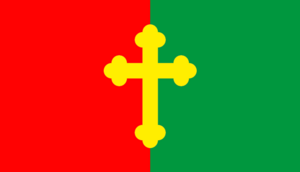Jaragua (Elparia)
Jaraguan Republic Republic Jaraguan | |
|---|---|
|
Flag | |
| Motto: "Revolution nyah sleep
(Revolution never sleeps)" | |
| Anthem: ¡Onward! | |
| Capital | Spira |
| Largest | Branton |
| Official languages | Jaraguan |
| Recognised national languages | Arellian |
| Recognised regional languages | Inner Jaraguan |
| Demonym(s) | Jaraguan |
| Government | Unitary one-party republic |
• First Director | Ibino Carerras |
• Second Director | Edmundo Castillo |
| Legislature | National Directorate |
| Presidium | |
| Chamber of Directors | |
| Independence from Arells (Elparia) | |
• Independence Declared | May 29th, 1927 |
• First Republic | March 1st, 1947 |
• Military Government | April 8th, 1966 |
• Revolutionary Government | January 15th, 1970 |
• Second Republic | December 31st, 1979 |
| Population | |
• 2023 estimate | 1,720,273 (78th) |
• 2018 census | 1,678,591 |
| GDP (nominal) | 2023 estimate |
• Total | $30 billion (64th) |
• Per capita | $17,712 (36th) |
| Gini (2020) | 39.6 medium |
| HDI (2022) | .808 very high (44th) |
| Currency | Jaraguan Peso ($) (JP) |
| Date format | dd/mm/yy |
| Driving side | right |
| Calling code | +13 |
| Internet TLD | .jar |
Jaragua, officially the Jaraguan Republic, is an island country comprising the island of Jaragua and several small islands and cays off its coast. It is located within the Coltegan Passage.
Etymology
The indigenous people, the Emiyit, called the island Sharaka in their language, meaning the "Land of Wood and Water" or the "Land of Springs". Colloquially, Jaraguans refer to their home island as "Jara". Slang names such as "Jar", "Jarland", "Yanya" in Jaraguan, or briefly "Ja", have derived from this.
History
Prehistory
Olympian rule (1509-1802)
The first Olympian settlement on the island was Saria, which was established in 1509 by Carlos Vasquez. The capital was moved to Nuevo Tepro in 1535. Meanwhile, natives began dying in large numbers, both from disease and enslavement by the Olympians.
Though often thought to have been extinct following contact with colonists, the natives still inhabited the island when the Arellians took over in 1802. Most fled into the interior regions, merging with the maroon communities.
Early Arellian period
During the 1700s the economy boomed, based largely on sugar and other crops for export such as coffee, cotton and indigo. All these crops were worked by black slaves, who lived short and often brutal lives with no rights, being the property of a small planter-class. In the 18th century, slaves ran away and joined the Maroons in increasing numbers, and resulted in The First Maroon War (1728 – 1739/40), which ended in stalemate. The Arellian government sued for peace, and signed treaties with the Eastern Maroons led by Jajoe and Hunnapeng in 1739.
Later colonial period
Post-independence
First republic
Military government
Revolution
Coup d'etat attempt
Second republic
Government and politics
The Revolutionary People's Council is the only legal party in Jaragua. Other political groups are not allowed to organize. The country is led by the First Director, who is appointed by the the RPC Congress every ten years, along with the Presidium of the Directorate, which is tasked with organizing sociopolitical and economic programs. The Chamber of Directors is formed by the directors of each state company, which have monopolies on respective industries.
